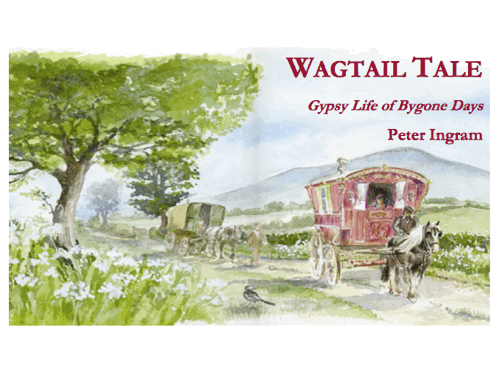ABOUT THE AUTHOR
Peter (Pete) Ingram was born in rural Worcestershire. He bought his first living-wagon (Gypsy caravan) in his early teens and this led to his main occupation of ‘Builder, Restorer and Decorator of Living-wagons’.
In 1976 he established the Romany Folklore Museum, the first museum of its kind in Great Britain. He closed the museum and workshops in 1995, having decided to ‘see the world’. His last commission to paint a living-wagon was in America in 2005. He ‘retired himself’ in 2007, and now lives a quiet life in a small village in Hampshire.
He is co-author of Romany Relics – The Wagon Album (the definitive book on the Gypsy caravan), published by John Barker (2010).
A 19-track CD of songs and Romani language examples, featuring the voice of Peter Ingram, is available to complement the book. Please click on the links below to download the overleaf to order. Old Fiddle Tunes & Sentimental Songs of Welsh Border Gypsies
‘When you see the wagtail you will see Gypsies’ (old Welsh Gypsy saying)
A long-lost way of life, under conditions of some privation by modern standards, is brought vividly to life in this book. Accurate details and the Romani language, both impeccable, combine to make this one of the most interesting and genuine accounts that I have read. The narrative works extremely well, allowing the juxtaposition of the old and the new, and throughout the book the ‘rightness’ of dialogue and description are fascinating. Factual events are woven into a tale of merit that will captivate the reader, young or old, from cover to cover. Dominic Reeve
Old John and Genty, two Romanies, now permanently encamped with their wagon and tent in a quiet spot along a green lane close to the Welsh border, living out their last years in peaceful contentment. Their estranged daughter becomes ill and needs a lengthy stay in hospital, and their two grandchildren, Little Jimmy and Katie, come to stay with them.
Over the following weeks the children begin to discover the lifestyle which is their unknown heritage. Old John teaches Jimmy the skills of his forefathers, from making and using a catapult to making pegs, and Genty shows Katie how to prepare and cook food over the open fire. At night around the fire Old John recalls tales of life in days gone by. Other relations walk through the pages with their own tales, portraying the lives they lead and recording their traditions and taboos. There is a visit to the ancient Obie and Britty, living in a woodland clearing in Wales in their woodsmoke-impregnated tent, giving a last glimpse of an almost forgotten lifestyle.
The author captures the essence of a way of life already fast disappearing by the 1960s. This book is not looking back with rose-tinted glasses, but captures the reality. You can almost smell the woodsmoke and damp earth, feel the discomforts and difficulties of keeping body and soul together, but sense also the contentment of living close to nature, the loving relationships, and the respect and eagerness of the younger generation to learn the old ways. Little Jimmy and Katie are now grandparents themselves, and their real names are concealed to preserve their privacy.

